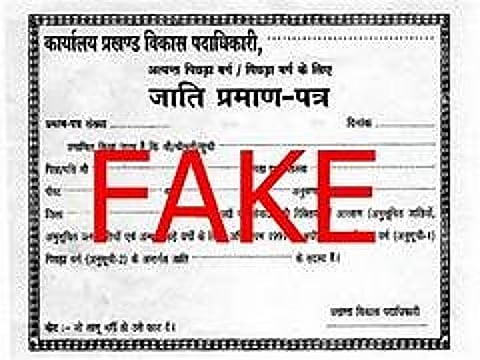
New Delhi- The Supreme Court has delivered a significant verdict in a high-profile case involving a fraudulent caste certificate from Maharashtra, granting substantial relief to the appellant, Chaitanya.
The case revolves around her claim of belonging to the "Mannervarlu" Scheduled Tribe (ST) listed under Serial No. 27 of the Presidential Order, 1976. Chaitanya, born on August 7, 1998, was issued a caste certificate on July 1, 2009, while still a minor, certifying her as a member of the Mannervarlu Scheduled Tribe. Aspiring to pursue an MBBS course, she approached the Scheduled Tribe Caste Certificate Verification Committee through her father on July 30, 2015, for verification of her certificate.
However, the Scrutiny Committee delayed the necessary inquiry, allowing Chaitanya to secure admission to the MBBS course on July 24, 2016, based on her caste certificate. She successfully completed her MBBS in 2021 and performed well throughout, as evidenced by her strong academic record, including an excellent performance in her 12th standard examinations. She also completed her internship after finishing her final year on May 5, 2021. Meanwhile, on July 7, 2022, the Verification Committee ruled that Chaitanya did not belong to the Mannervarlu Scheduled Tribe.
By this time, she had not only completed her MBBS but had also secured admission to a postgraduate (PG) course under the general category, where she is currently in her second year. Challenging the committee’s decision, Chaitanya filed a writ petition before the Bombay High Court, which was dismissed, affirming the committee’s order. The core issue in the case was the fraudulent conduct of Chaitanya’s father and uncle, who had suppressed earlier rejections of their tribe claims to obtain new certificates.
The Aurangabad Bench of the Bombay High Court, in its judgment dated July 24, 2023, in Writ Petition No. 8531/2022, upheld the Verification Committee’s order dated July 7, 2022. The High Court found that Chaitanya’s father, Sanjay Palekar, and uncle, Rajiv Palekar, had their tribe claims invalidated in 1989, with appeals dismissed in 1991. Despite this, they concealed these rejections and secured new validity certificates in 2007.
The court labeled this as a constitutional fraud, noting that Chaitanya’s father had submitted a false affidavit before the committee, claiming no family member had faced invalidation. The High Court relied on the Supreme Court’s ruling in Raju Ramsing Vasave vs. Mahesh Deorao Bhivapurkar (2008) 9 SCC 54, which stated that certificates obtained through fraud are invalid and not binding for other family members. The court observed that the validity certificates of other relatives cited by Chaitanya were also tainted by fraud, as earlier rejections were suppressed.
Addressing arguments about the committee’s power to review its decisions, the court clarified that this was a case of patent fraud, not a review issue. It rejected Chaitanya’s reliance on other court orders directing the issuance of validity certificates pending inquiries into relatives’ certificates, emphasizing that this case was a glaring example of constitutional fraud. The court dismissed the writ petition, stating that Chaitanya could not benefit from the fraudulent actions of her father and relatives.
On August 25, a bench comprising Justice J.B. Pardiwala and Justice K.V. Viswanathan of the Supreme Court, in Civil Appeal No. 11196/2025, partially allowed Chaitanya’s appeal. The court upheld the High Court’s findings, stating that no legal error was committed, but granted relief considering Chaitanya’s academic merit and career prospects under exceptional circumstances.
The court noted that Chaitanya had completed her MBBS and was pursuing a PG course in the general category, and dismissing her appeal would jeopardize her entire career. It held her father primarily responsible for the predicament, as he suppressed critical facts, putting his daughter in a difficult position. Referring to its interim order dated November 28, 2023, the court recorded the father’s undertaking, in which he relinquished all claims to the Mannervarlu Scheduled Tribe status for himself and his family.
The court regularized Chaitanya’s MBBS admission and directed the university to issue her degree certificate, which would be final. However, it barred Chaitanya from ever claiming Scheduled Tribe status in the future. Acknowledging that a deserving Scheduled Tribe candidate lost an opportunity due to this fraud, the court ordered Chaitanya’s father to deposit ₹5 lakh to the National Defence Fund within two months as compensation. The case was listed for compliance reporting after two months. The court also remarked that had the Verification Committee conducted a timely inquiry, this situation might have been avoided. The Supreme Court’s order supersedes the High Court’s judgment, regularizing only Chaitanya’s MBBS admission while affirming the High Court’s findings on all other aspects.
You can also join our WhatsApp group to get premium and selected news of The Mooknayak on WhatsApp. Click here to join the WhatsApp group.